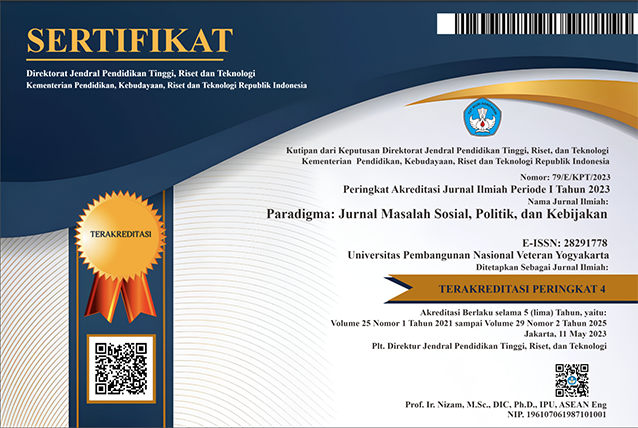Environmental And Socio Political Impact Of Oil Production And Consumption: Case Of Indonesia
DOI:
https://doi.org/10.31315/paradigma.v18i1.2404Keywords:
ampak lingkungan, dampak sosial, produksi minyak, kerangka kerja keadilan lingkungan, Indonesia.Abstract
Minyak adalah mesin untuk pertumbuhan ekonomi dan langkah dari pembangunan dunia dimana di abad yang lalu telah terbukti. Menggantungkan nasib pada minyak, bagaimanapun, akan mengatar kepada penghancuran pertumbuhan karena minyak bukanlah sumberdaya alam yang dapat diperbarui. Secara umum, makalah ini berusaha untuk menampilkan persoalan produksi dan konsumsi minyak Indonesia dimana persoalan minyak dapat dilihat sebagai persoalan kehabisan sumberdaya alam dengan Indonesia sebagai studi kasus. Dengan menggunakan kerangka kerja keadilan lingkungan, makalah ini terutama memfokuskan pada bagaimana industri minyak berdampak pada keadaan lingkungan dan kehidupan sosial politik masyarakat.Downloads
How to Cite
Issue
Section
License
The manuscript submitted to Paradigma: Jurnal Masalah Sosial, Politik, dan Kebijakan journals are released under the license of Creative Commons Attribution-Non Commercial- ShareAlike (CC BY SA) if and when the article is accepted for publication.
We declare that:
- This paper has not been published in the same form elsewhere.
- It will not be submitted anywhere else for publication prior to acceptance/rejection by this Journal.
- A copyright permission is obtained for materials published elsewhere and which require this permission for reproduction.
Retained Rights/Terms and Conditions
Authors retain all proprietary rights to the published works, such as (but not limited to) the following rights:
- Copyright and other proprietary rights relating to the article, such as patent rights,
- The right to use the substance of the article in own future works, including lectures and books,
- The right to reproduce the article for own purposes,
- The right to self-archive the article
The right to enter into separate, additional contractual arrangements for the non-exclusive distribution of the article's published version (e.g., post it to an institutional repository or publish it in a book), with an acknowledgment of its initial publication in this journal Paradigma: Jurnal Masalah Sosial, Politik, dan Kebijakan



